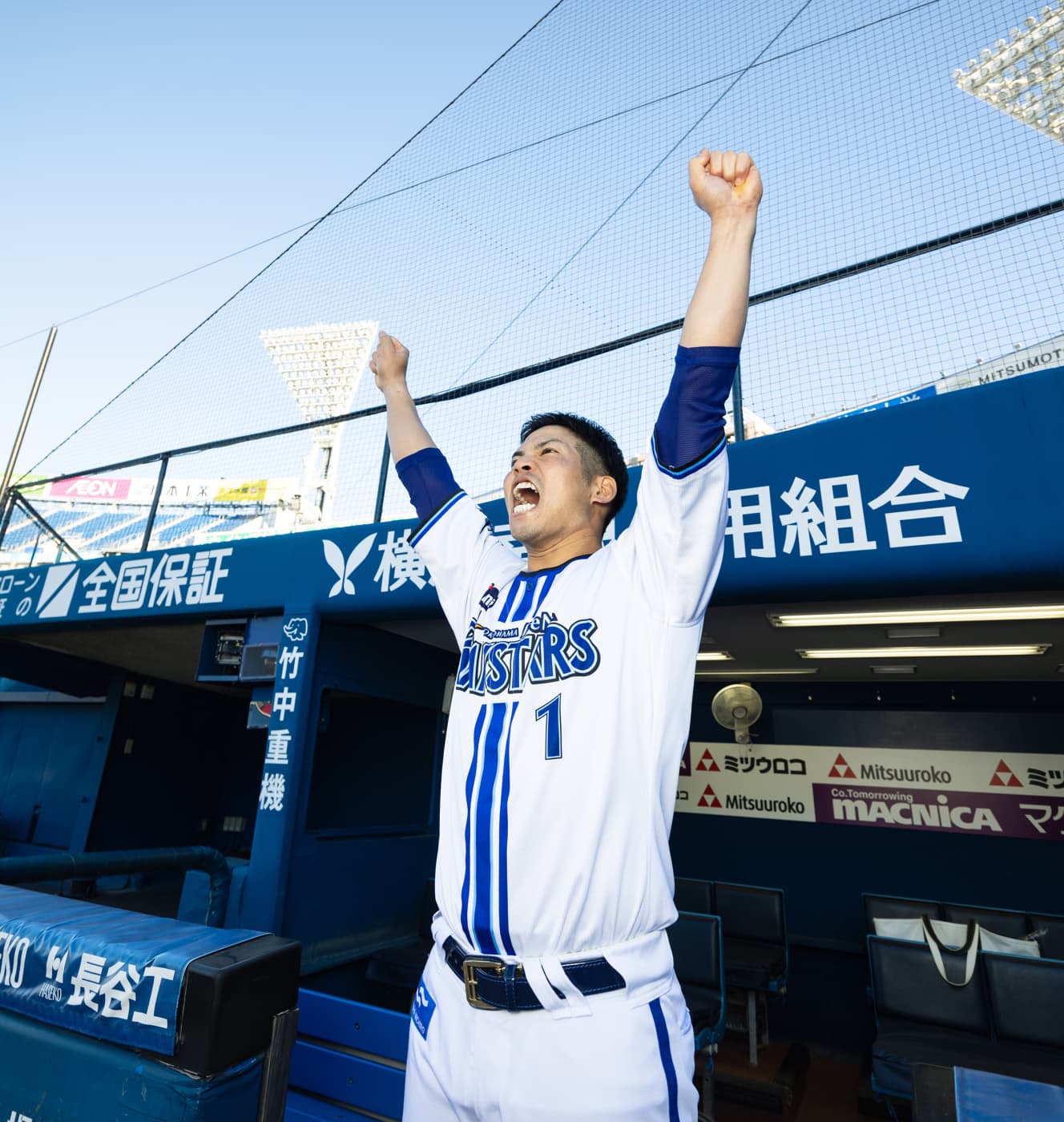Japan Series MVP Kuwahara: “I Can’t Say I’m Struggling”
Interview with Yokohama DeNA's leadoff man, who dances the "Kitsune Dance" of the Fighters' girls on the bench and has many fans in the Pacific League.

DeNA’s mood maker
“Sweet Potato Tart!”
During the “WBSC Premier 12” held in November, DeNA’s Masayuki Kuwahara (31) teased Orix’s Kotaro Kurebayashi (22) while practicing. The unexpected remark made Kurebayashi burst into laughter. The atmosphere of the Samurai Japan team instantly became more relaxed. Kuwahara reflects:
“I had been calling him ‘Sweet Potato Tart!’ from the bench because of his last name. Since we became teammates, I thought I’d say it again.”
Kuwahara is the lead-off man and mood maker for DeNA. During the Japan Series against SoftBank, he earned the MVP award by achieving a team-leading .444 batting average, one home run, and nine RBIs. Although he gained widespread attention as a star player, his path hasn’t been without hardships. He shares his challenging baseball journey.
Born in Izumi City, Osaka Prefecture, Kuwahara began playing baseball in second grade. In middle school, he played for the “Izumi Boys,” and later attended the prestigious Fuchiyama Seibi High School in Kyoto Prefecture. Although he didn’t make it to Koshien, he stood out as a regular third baseman and shortstop, finishing his senior year with a solid performance of 6 hits and 5 RBIs in 16 at-bats during the Kyoto Prefecture summer tournament.
“I’ve wanted to be a professional baseball player since I was a kid. So when I was drafted by the BayStars in the fourth round (in 2011), I was genuinely thrilled. To this day, that’s the only time I’ve cried tears of joy.”
Yips.
However, the joy was short-lived. Shortly after entering the professional world, he faced adversity.
“I think it was due to the team’s situation, but I was often used at second base. I had never played second base before; I had played third and shortstop in high school. In that unfamiliar position, I couldn’t get the feel for throwing, and I developed the yips. My poor defense affected my batting, creating a vicious cycle. I would think, ‘I have to play baseball again today’ and walk heavy-footed to the field. If I had continued at second base, I don’t think I’d still be in the professional world.”
The turning point came in 2013, when then minor league manager Daisuke Yamashita suggested he switch to the outfield.
“It might sound misleading, but I felt that being an outfielder allowed me to throw with more freedom than second base. My throwing issues gradually disappeared. I was also encouraged by my senior from high school and teammate, Shigeo Yanagida. He told me, ‘Don’t think too much about the future. Focus on each pitch and at-bat.’ At that time, I was anxious about my future, so his words really helped me stay positive.”
Opportunities in the first team increased, and by 2017, he played in all 143 games. His team made it to the Japan Series against SoftBank after a dramatic climb from third place in the Climax Series. Kuwahara played center field in the leadoff spot. However,
“From the very first at-bat in the first game, I went 14 at-bats without a hit, and I completely stopped the team’s momentum. When we lost the sixth game in a walk-off and lost the championship, I couldn’t move from the bench. I was not only frustrated but also filled with intense anger towards myself. I realized that I had to improve more. I have to become a player who can contribute to the team’s victories.”
Ironically, this year’s Japan Series featured the same matchup against SoftBank, with a third-place team making it to the finals again. But DeNA started the series with losses. The nightmare of seven years ago resurfaced. After a game, Kuwahara motivated his teammates with anger.
“I didn’t feel the energy of fighting desperately. There was this strange sense of complacency, like it was okay to lose because we made it this far from third place. It frustrated me. I told them, ‘We can’t forget the mentality we had while fighting to get here.'”
From game 3 onward, Kuwahara’s physical play lifted the team’s spirits. He made a diving catch on a hit-bound ball and even slid headfirst to get an infield single.
“If you’re afraid of getting hurt, you’re not a pro. I plan to play even if my body is falling apart. I can’t say it’s tough. When I think about the people who supported me during tough times, I can’t afford to sulk.”
Kuwahara is not just a stoic player; he’s also famous for his bright character. During an interleague game against Nippon-Ham, he wowed Pacific League fans by dancing the ‘Fox Dance’ with the Fighters Girls in the bench area.
“I was sitting next to Yamato (37) and thought, ‘I’ll make him laugh.’ I sometimes tease my teammates, but there’s no special intent behind it. I don’t mind being disliked; I just want to be myself.”
After defeating SoftBank, Kuwahara ended the season in the best way possible, as a Japanese champion. He was finally relieved from the pressure. At the end of the interview, he spoke with a relaxed expression:
“At Yokohama Stadium after winning the championship, I saw the most beautiful night sky. I had been so tense for so long, it felt like a dream.”


 An unpublished cut from the interview: Japan Series MVP! Kuwahara Masayuki: “I can’t say ‘it’s tough.'”
An unpublished cut from the interview: Japan Series MVP! Kuwahara Masayuki: “I can’t say ‘it’s tough.'”PHOTO: Hiroyuki Komatsu